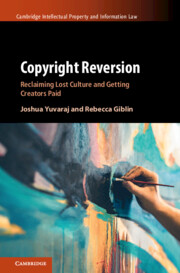Acknowledgements
This book and the research within it have been supported with funding from:
The Australian Research Council, via FT17010001 (‘The Author’s Interest Project’) and LP160100387 (‘The eLending Project’)
The University of Melbourne
Monash University
The University of Auckland Research Development Fund
The Australian Government via a Research Training Program Scholarship
The funders of Untapped: The Literary Heritage Project (i.e. state and territory libraries from around Australia, plus contributions from a small number of private philanthropists)
Incorporation of Prior Work
This book is the culmination of research conducted between 2017 and 2024. With the permission of the copyright holders, it incorporates some material from the following publications:
Joshua Yuvaraj, ‘Implementing Copyright Revocation in Ireland and Malta: Lessons for Lawmakers’ (2023) 18(7) Journal of Intellectual Property Law & Practice 528.
Joshua Yuvaraj, ‘Back to the Start: Re-envisioning the Role of Copyright Reversion in Australia and Other Common Law Countries’ (PhD Thesis, Monash University, 2021).
Joshua Yuvaraj, Rebecca Giblin, Daniel Russo-Batterham and Genevieve Grant, ‘U.S. Copyright Termination Notices 1977–2020: Introducing New Datasets’ (2022) 19(1) Journal of Empirical Legal Studies 250 © 2022 The Authors. Journal of Empirical Legal Studies, published by Cornell Law School and Wiley Periodicals LLC.
Rebecca Giblin, ‘A New Copyright Bargain? Reclaiming Lost Culture and Getting Authors Paid’ (2018) 41 Columbia Journal of Law & the Arts 369–411.
Joshua Yuvaraj and Rebecca Giblin, ‘Are Contracts Enough? An Empirical Study of Australian Publishing Agreements’ (2021) 44(1) Melbourne University Law Review 380.
Joshua Yuvaraj and Rebecca Giblin, ‘Why Were Commonwealth Reversionary Rights Abolished (and What Can We Learn Where They Remain)?’ (2019) 41(4) European Intellectual Property Review 232
Rebecca Giblin and Cory Doctorow, Chokepoint Capitalism (Beacon Press, 2022).
Individual Acknowledgements
We’re grateful to academic colleagues from around the world for generously contributing their knowledge and expertise to the project, particularly Jane Ginsburg, Sam Ricketson, Martin Kretschmer, Séverine Dusollier, Ula Furgal, Paul Heald, and Paul Crosby.
We also thank the marvellous research assistants who have assisted us in pulling the book together: Anders Furze, Tessa Barrington, Joseph Zivny and Sian Vaughan-Jones, as well as Kirsty Wilson from Melbourne Law School’s academic research service. Thanks to Fiona Rotstein for assisting with formatting and footnotes. Thanks also to An Hertogen and Maude Loutsch for invaluable assistance with French-language materials.
Thanks lastly to friends, family and colleagues who helped to sense-check draft chapters and who provided friendship and support throughout the writing process, particularly Brad Williams, Rachel Goh, Jeremy Yuvaraj, Joanne Yuvaraj, Yuvaraj Malaipan, Mui Mui Tan, Treasa Dunworth, Julia Tolmie, Lucy Holloway, Andrew Godwin, Jodi Gardner, Alexandra Allen-Franks, Craig Elliffe, and Daniel Gilbert. A special mention goes to Muntaha Khan, without whose dedication, support and encouragement this book would not exist.
